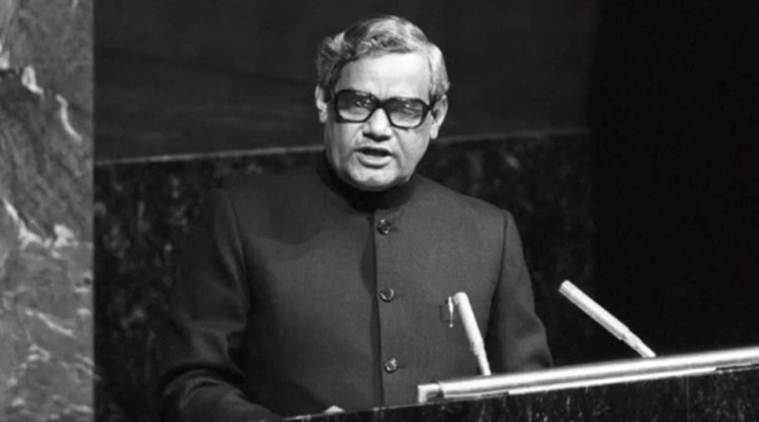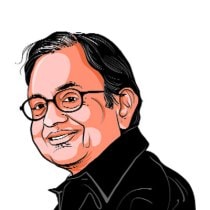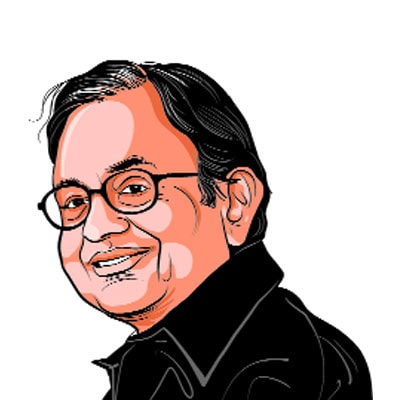Across the aisle: Mr A B Vajpayee, RIP
To most of his party colleagues and the RSS, he was the right man to lead the ‘right’ party. To many belonging to other parties, he was the right man in the wrong party!

“Vajpayeeji was a true democrat who recognised the legitimate role of the Opposition.”
Mr Atal Bihari Vajpayee, 93, passed away last Thursday after a long battle with illness. He started his political career as a swayamsevak, remained a member of the Jana Sangh until its merger in the Janata Party, founded the Bharatiya Janata Party(BJP) with Mr L K Advani in 1980, and remained loyal to his party until his last day.
To most of his party colleagues and the RSS, he was the right man to lead the ‘right’ party. To many belonging to other parties, he was the right man in the wrong party!
I saw Vajpayeeji from a respectful distance. When I entered Parliament in 1984, he was one of two members belonging to the BJP. The Bofors deal provided a lifeline to many parties that had been decimated in the previous election, and none gained more than the BJP. However, the unlikely winner was V P Singh. Between 1989 and 1991, Vajpayeeji and I sat in the Opposition benches, the difference being that his party supported the V P Singh government while my party opposed it. It came as no surprise that the contradictions between a Congressman-turned-anti-Congressman (V P Singh) and the BJP erupted in 11 months — leading to the jibe that it was Mandal vs Kamandal.
Reassuring face of BJP
For the next six years, Indian politics was marked by a bitter struggle for primacy between a weakened Congress and a resurgent BJP. The driving force was Mr L K Advani, the reassuring face was Vajpayeeji.
Atal Bihari Vajpayee took oath as Prime Minister thrice. His first government — a gross miscalculation — lasted all of 13 days. His second government huffed and puffed and ultimately fell in 13 months, losing by one miserable vote. My personal view was that the Congress should have let the Vajpayee government continue, and not vote it out, until it collapsed, as it was bound to do.
In his 13-month stint, Vajpayeeji had burnished his image by Pokhran II and standing up to US sanctions. The one-vote loss brought him a flood of sympathy. That was sufficient to boost the BJP’s tally in the 1999 election to 182 and put Vajpayeeji back in the seat of Prime Minister.
All friends, none enemy
As far as Vajpayeeji was concerned, that was his finest hour. Not for himself but for his party, he softened the rough edges of the BJP, made friends, attracted allies, mediated quarrels, preached raj dharma, ceded authority to his colleagues, delivered modest economic growth and, surprisingly, dropped hints of retirement in “two to four years” (December 2002).
Throughout the six-year period, he won numerous friends but made no enemies. That was Vajpayeeji’s distinguishing hallmark. When he left office in May 2004, and when he died last week, everyone had nothing but good and kind words to say about him.
I wish to recall two events that involved Vajpayeeji and me.
The first was in 1988-1989. The Bofors case had hobbled the Rajiv Gandhigovernment. The brief was handled in Parliament by a succession of ministers until it landed in my lap in late 1988. After studying the record carefully, I came to the conclusion that money had indeed been paid by AB Bofors to secure the contract, but there was no evidence that an Indian minister or an Indian official had received the money. I sought and obtained Rajiv Gandhi’s permission to make this important statement at the next available opportunity. The opportunity came within days. Vajpayeeji opened one more debate on Bofors. Answering on behalf of the government, I made my statement based on my conclusion. I still remember the look of puzzlement on Vajpayeeji’s face. He rose to admonish me and said that he ‘did not expect Mr Chidambaram to make a statement exonerating the bribe takers’, or words to that effect. I insisted that I was speaking the truth. (On February4, 2004, a judge of the Delhi High Court threw out the CBI’s charges against Rajiv Gandhi.)
A man of grace
The second was in 1997-1998. I was finance minister in the United Front government and was piloting the Bill to throw open insurance to the private sector, including foreign investors. The main opposition came from the BJP and the main grievance was that the clause permitting foreign investment. To find agreement, I offered to limit the foreign holding to 20 per cent. Vajpayeeji agreed. The stumbling block was Mr Murli Manohar Joshi, but Vajpayeeji promised me that his party would support the Bill. After the debate was over, voting started, clauses 2 to 12 were passed, but Mr Joshi opposed clause 13 that allowed FDI. Vajpayeeji took me behind the Speaker’s chair and expressed regret for being unable to keep his promise. The Bill faced defeat, but I refused to withdraw it. I K Gujral, prime minister, stepped in and the Bill was withdrawn. (Poetic justice was a few years away. In 1999, the Vajpayee government passed substantially the same Bill with substantially the same clause on FDI.)
I was not a Member of Parliament during 1999-2004. I turned columnist and did not spare the Vajpayee government. Not once did I get the sense that some one in the Vajpayee government was watching and counting the brickbats.
Vajpayeeji was a true democrat who recognised the legitimate role of the Opposition. History will remember him as a good and kind man, a gentle colossus.
Vajpayeeji was a true democrat who recognised the legitimate role of the Opposition. History will remember him as a good and kind man, a gentle colossus.
Website: pchidambaram.in Twitter: @Pchidambaram_IN
For all the latest Opinion News, download Indian Express App
More From P Chidambaram
- First anarchy, now autarkyAutarky will never be dead and buried six fathoms deep. It has a way of rearing its head from time to time, and that is…
- Across the aisle: Engaging with Mr Imran KhanMr Imran Khan has said that if India will take one step forward, he will be prepared to take two steps forward. That may simply…
- Across the Aisle: Debate, questions, but no answersThe no-confidence motion was lost, so was an opportunity to answer the questions of the people...








































No hay comentarios:
Publicar un comentario